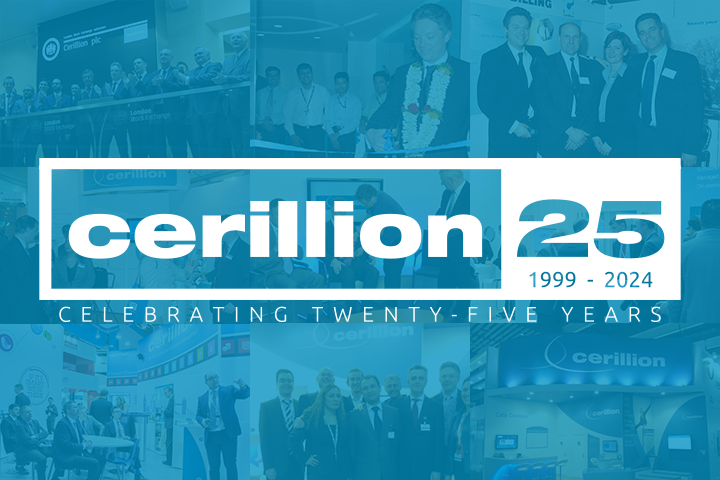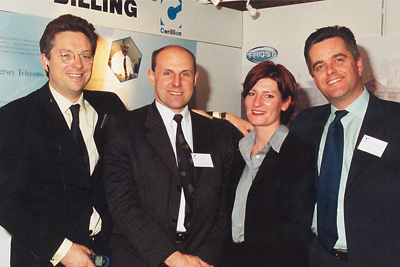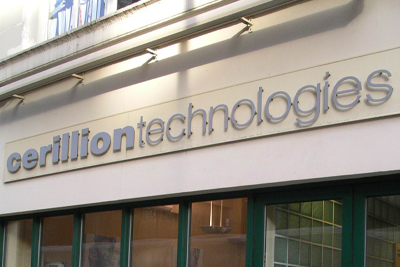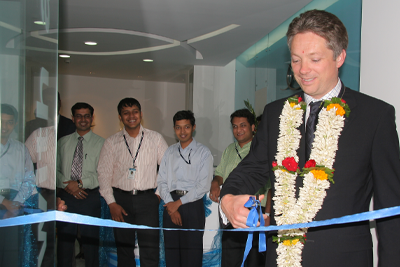Cerillion at 25: an oral history

From humble beginnings as the telecoms products division of Logica, to a half a billion dollar listed company, Cerillion has come a long way and created lots of happy memories over the years – and many more best forgotten!
To mark our 25th anniversary, we gathered the seven remaining members of the original team together to reminisce about the early days of the Company, through moving offices, the dotcom boom, the global financial crisis, and many, many foreign trips.
Cerillion, day one
“Anything you wanted to do differently, you could.”
Louis Hall [CEO and founder]: Cerillion’s spin-off from Logica was quite secretive, because right up until the last minute, they hadn't committed to go-ahead. It was one of those things where actually the price wasn't really a massive issue. I think some people in Logica saw a lot of value in hanging onto it, whereas others just didn't want to know at all and were glad to be rid of the liabilities. We needed investment to turn the product into something, but at the time, we didn’t really have a proper product.
Paul Landowski [Programme Manager]: I remember we had a company weekend in Amsterdam, where we had a meeting room, and we were asked to vote on a company name and what shade of blue for the company colour. I'm sure Louis already had a plan about what the name was going to be, but there was a semi-democratic vote!
Louis: It's interesting you say that we had the meeting about what the company name and brand colour should be, never mind how we were going to create a business that might survive more than six months! That was so typical of the Silicon Valley dotcom era.
I think a lot of people in Logica were predicting a disaster for us and there was a lot of uncertainty over whether the MBO would even happen. But we were lucky in having good sponsorship from John Coleman, who at the time was head of the telecoms division. He was very supportive, and in the end, Martin Read [Logica’s CEO] went along with it, but I think right up to the last minute, we didn't know whether it was really going to happen.
The thing that I remember about that day is having signed away my life to the bank in Jersey on the Friday, then getting the first flight to London on Monday morning and then going to the old Midland Bank headquarters, which is now The Ned Hotel, but used to be this enormous banking hall, where I picked up the certified cheque to hand over to the lawyers in Stephenson House [Logica HQ] to complete the deal. In those days a certified cheque actually had real value, so if you lost it, you lost the money. I thought if I get mugged now, it's all over!
Paul L: Yeah, it was certainly a risk joining Cerillion, and we didn't even know if it would be around in a year, but I guess we were younger and happy to take those kinds of risks. I remember going down to the pub beneath Stephenson House, before it was announced the company was formed, and discussing options there. Were you going to join the new company or stay with Logica – jump ship or not? We went down to the Institute of Directors, had a meeting, and then back up to Stephenson House and back to work. From my perspective, the variety was what I liked.
Paul Stanier [Developer]: Yeah, it was just about a change. I think it was nothing more than that for me. It was something different to do. We were all working in London, and it was sort of boring in that big office, I think as well. It was very corporate. I think that was what I just didn't particularly like.
Shelley Western [HR Officer]: I'm with Paul and Paul there. It was an exciting opportunity to be part of something from the get-go. Get away from the big corporate and see where it led. I didn't have a mortgage, so it was just, let's see where it takes me, and you know, here we are.

Jon Boothman [Technical Architect]: Yeah, I didn't enjoy this aspect of Logica either and I wanted to do something new. This sounded like a good time to jump ship. I probably would have jumped ship somewhere else if it this hadn't come up.
Alan Ward [Developer]: I remember one of my Logica colleagues going to chat to Louis, and when he came back, I said “what did you ask?” He said “well, what can we wear?” And Louis told him “You can wear your pants on your head if you want.” So then I asked him “so what job are you going to be doing?” and he said “I didn't ask about anything like that.” That was his only question!
Marlen Baker [Solution Architect]: I was a contractor at the time. I'm sure we had both originally joined Logica on the same day, Louis, at Newman Street. Then I think you made me an offer I couldn't refuse – an opportunity to do something else.
Alan: A lot of it was to do with location. I was in the Logica transport division and that was in Leatherhead, or "Leatherdead" as it was known, though I never actually worked there. And the fact that if you were at Logica, you needed to go into management for them to achieve their model. There wasn't the opportunity to carry on being just a programmer, becoming a technical leader rather than a people leader.
Louis: Yeah, good point. Although I'd never say just a programmer, by the way.
The industry as a whole was challenging at that time. People were starting up these companies one week and selling them weeks later, making fortunes. Some of us felt we could do that, but to be honest at the time it wasn't about thinking we were going to make loads of money – it was to do something different and create something new and independent. Or be chewed up and spat out without anyone noticing. Well, you think about how young we all were and, to be honest, I was quite naïve.
The first office
“I don't think we were ready to sort of give up the pool table in the basement”
Louis: So, we had a company – then we had to find an office, plus a year's rent, deposit, references, and we didn’t have any of that.
Paul L: It was quite a few months until we got our first office, in Adeline Place. I can't remember how long we remained in in the Logica building, but it must have been at least six months.
Shelley: Going from that huge office where we were all spread out and you had to walk between floors to talk to one another, to one where we were all crammed in. The move was obviously an important step in terms of independence, but we were going from a lovely managed office to an unmanaged building. We had to manage all of those little things that go on behind-the-scenes – everything from aircon and security to cleaning and picking up the milk. And you wouldn’t dare use the lift at Adeline Place because it was always breaking down! When the head count grew dramatically and we needed another twenty desks squeezed in, we had to think quite quickly and thankfully by that time we’d developed good relationships with our external contractors.
Louis: Not worn down by life and corporate bureaucracy and building managers and landlords, we were able to get things done better. Well, it's incredible to think how many people are needed to do all these things now, and we just had you then Shelley. I've no idea how you did it.
Shelley: Thanks. I was a ‘jack of all trades’, I had a hat for everything. It was like “what department am I today? Office manager, HR – yeah, sure.” They called me Del Boy, but I preferred Shell Boy! Very long days, but equally very rewarding. I was younger then, had the stamina!
At one stage we had a little satellite office in Alfred Place when we'd expanded quite quickly. It was just for a year. I can't even remember which team we shipped out, but possibly Support. I don't think we were ready to give up the pool table in the basement!

Louis: It was 2001-2 and we’d just raised all the private equity funding.
Alan: Something I really liked was when we were in Centre Point and I had a window seat on the 27th floor - I could look out across the whole of London and see the sunset and I enjoyed that. Not so good when it was cloudy, and you couldn't see the ground, or when you could see it raining on one side and not on the other.
Shelley: I don't know if anybody remembers the case of the stolen Christmas tree? We’d gone off to our Christmas party, and a few rebels decided to drag the Christmas tree from reception at Adeline, across Oxford Street, over to Centre Point, and then they set it up. Beautiful. I mean, it was missing the lights, and baubles were everywhere. And then there was this big conspiracy theory as to who did it.
Louis: We did a lot more social stuff in those days, maybe because we were all younger and didn't have children to worry about, or maybe just because the team was smaller. We were that small group in the office every day, God forbid. It's not quite like that now – we have some good parties still, but not quite the same.
Shelley: Yes, the Friday Binge [named after a colleague, Ian Binge] was a big part of the company culture for a long time – at least half our marketing budget went towards that! From a personal perspective, I'm very glad that we didn't have social media back then...
3G
“I don't know how I didn't die of pneumonia.”
Louis: It was around that time we worked on the 3G network with Manx Telecom and NEC, the first in Europe, in fact. My biggest memory from then was going to meet the Vice President of NEC, who flew in on a private jet to play golf in the Isle of Man. And this being the Isle of Man, the golf course is on the cliffs, and there were storm warnings, sideways rain, danger to life from being struck by lightning or falling off. And of course I didn't even know we were playing golf, I thought we were just having a meeting, so I arrived with no golf gear or wet weather clothes. Coming back off the course after three and a half hours – I don't know how I didn't die of pneumonia.
Anyway – back to 3G. It was obviously transformational, and it gave us quite an edge in the market. I think what we had was able to mostly support 3G already. So it wasn't a massive leap because we already had that capability to deal with it, but it certainly got us on the map.
Paul L: Manx was a division of O2 then, wasn’t it? I remember lots of O2 senior managers coming in because it was such a high-profile project.
Louis: Yes, a lot of O2 top brass. The other thing from that time was going to the launch of O2 at the London Eye. I remember my PA being absolutely beside herself because she got to meet the boy band Blue. Remember Blue? They were playing at the opening, we were right at the front, and she got to chat to Blue. And I said “well, I'm sure that's great… No, I've got no idea who they are.”
The turning point
“It was a do-or-die time…”
Louis: From my perspective, it was pretty hard for at least the first ten years, and we were always hanging off the next sale for a very long time. I think we did incredibly well to trade through the dotcom crash and then the global financial crisis of 2007-8. We survived and regrouped, but it doesn't take away how painful that process was at the time.
Marlen: When we won the Caudwell project, that seemed to be the big change. We started adding more things into the product and interfacing with more things, which we now do all the time, involving lots of people and goodness knows what else. I remember the first day of that project, travelling with our project manager who was trying to write his presentation about how we're going to do the project, on the train. A bit hairy, that was, but somehow, we got through it.
Louis: I think you're right, Marlen, Caudwell was a massive turning point – not to mention their parties, they were a turning point too. That was maybe 2006 or 2007…?
Alan: … I've tried to block it out, but it was 2004.
Louis: Buying the interconnect business from CACI was also a big milestone in 2002. That was quite a trade, quite a milestone. It was the first time we bought another company and had to integrate other people. And if you think back there were lots of billing and CRM companies doing what we were doing in some form or another. It was a do-or-die time.
By the end of the decade, things were a lot more stable and we weren't living hand-to-mouth. The product was being put through more, different scenarios, and marketing had become more professional.
Cerillion goes global
“You can roll a ball uphill.”
Louis: I remember, Jon, in the Logica days you and I were in Cyprus when they launched the GSM mobile service there, one of the first in the world, and they thought they'd get only 100 customers in the first three months. But the whole island turned out to get the new service, queuing around the block, and we couldn't keep up with costing the calls – as we called it in those days, long before convergent charging.
Jon: Yeah, I do vaguely remember being in Cyprus, fixing problems via modem over in another country. We had to rewrite that programme overnight so that they could add more customers the next day, and I think we did it. It would be much harder to work in that guerrilla way today, but yeah, we did whatever was needed to get it working.
Marlen: We did that in Poland as well to avoid going on that awful 800-mile road trip to the Tatra Mountains, to spend an hour looking at an optical illusion road that looks like it sloped down instead of up. “I must show you something. It's only a seven-hour drive… Yes, it's a road. It's a funny road that looks like it's going up when it's going down. You can roll a ball uphill.” We said we had to redesign something.
Louis: Yeah, I remember that. We probably just went to the pub, but it was a good escape.
Shelley: I remember getting on a plane to Malta with a bid in my hand. I had to get there for 9am the next day. So it was “what are you doing for the rest of your evening, can you just go home and get your passport?” I was like, “OK.” But at least I got to spend the next day on the beach waiting for my plane. How things have changed in terms of delivering proposals and bids now, though.
Paul L: Yeah. And Cambodia was an interesting one. I liked Cambodia, very cool. Lots going on there. Especially in the mid-90s – there were no cars on the roads in Phnom Penh. We had lots of team meetings in Jersey or social events in the first few years, and lots of travel. We had a lot of energy back then!
Louis: Yeah, that's right. I think the other big change was India, and the opening of our office in Pune in 2006. That's probably the point at which it became a lot more corporate, because suddenly it wasn't just a team of people based around an office in London – we were suddenly an international operation, and there was this whole other entity that needed organisation and structure.
There’s a sort of youthful enthusiasm in India. They're like us 20 years ago, and it’s quite inspiring to see. They don't see problems, they just see the ambition. And the same is now true in Bulgaria as well.

The IPO
“… and it suddenly became very real for people, rather than this small business.”
Shelley: The other big milestone was the IPO in 2016. I was locked in an office with Oliver Gilchrist [CFO at the time] for about a year running up to it - there was a lot of hard work. It was an amazing milestone for the company, which I was super proud of. I was relieved when it was done, and we went over to the London Stock Exchange for the opening.
Paul L: Yeah, up on the balcony. I guess it's a milestone for the company that shows a certain level of maturity from an external point of view, and it tells a story, in terms of explaining the company to anybody on the outside, certainly I found the IPO quite a big thing. You were able to say “we're a listed company” and it suddenly became very real for people, rather than this small business.

Louis: It's interesting; when I talk to our people, that’s what I hear most often. They say it didn't change what they were doing from day-to-day. But for the people who were directly involved in the IPO, it was a big thing. Endless meetings with lawyers and advisors and all the rest of it. But possibly when you talk to family and friends and so on about it, it gives it a bit more perspective. You know, I was in this company from day one and now it's a PLC with a much higher market cap, I think that that makes a difference to people.
And because we’ve performed so well in a market where a lot of companies haven’t performed well at all. That's why a lot of tech businesses have been taken out or moved to NASDAQ. But we haven't had that experience – we get a lot of press coverage as one of the few UK tech stars, even though we’re relatively small, and the view is that we will become a unicorn in a couple of years.
Alan: I've been in the pub, my mate’s got his phone out and said: “is this your company?” It's one of those things where he has shares in his portfolio, and somebody's put Cerillion in, he's not picked it, but it's been the one that's made the most for him that month. That was when we were about £6 or so, but it's probably gone up now, right?
That was then and this now
“… It feels as exciting today as it did then – but in a very different way”
Louis: Lots of very good memories – and a few hairy moments that we wouldn’t want to repeat. The business is very different now – we’re working on bigger, more challenging projects, with larger customers and more sophisticated requirements, but we’re also still working with most of the smaller ones that we started out with. It feels as exciting today as it did then – but in a very different way. At any rate, there’s a lot of rocket fuel in the tank, which will power us to the next stage in Cerillion’s development!

